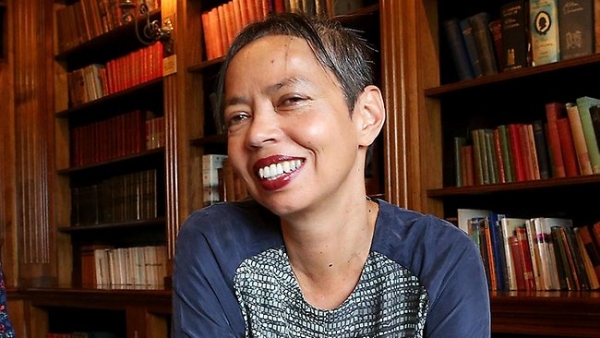Michelle de Kretser, a Sri Lankan-born Australian writer won the Miles Franklin Literary Award at the Melbourne Writers Festival for her most recent novel, The Life to Come.
The Miles, Australia's most significant literary prize, is worth $60,000 plus a fillip in sales to the winner. The Life to Come was chosen from a shortlist that also included: No More Boats, Felicity Castagna; The Last Garden, Eva Hornung; Storyland, Catherine McKinnon; Border Districts, Gerald Murnane, and Taboo, Kim Scott. De Kretser becomes only the third woman to have won the Miles twice, after Thea Astley (four wins) and Jessica Anderson (twice).
De Kretser used her acceptance speech to castigate "disgraceful" politicians about the treatment of refugees on Nauru and Manus Island. She read aloud a list of names of those asylum seekers who had died there in the past five years, saying "we have not forgotten, we will not forget".
Her winning novel is told in five sections set in Sydney, Sri Lanka and Paris, with different characters appearing in each part. The one significant linking character is would-be Australian novelist Pippa Reynolds – real name Narelle, but she discarded it "because no one called Narelle's ever going to win the Booker" – who crosses paths with the others in various ways and circumstances.
The Life to Come is a satire that exposes Australians and Australia as seen at home and overseas. De Kretser said it was tough on some aspects of the country and certain kinds of people. "I did hope that a reader's feelings about Pippa would shift and swing about over the course of the novel. And partly that is in relation to who you're seeing her with."
She was particularly pleased that the judges recognised that being funny was not incompatible with being serious. "I think sometimes we tend in fiction to either do comic writing, which is a different thing, or if it's serious it tends to be quite humourless, earnest in fact. I think my novels have always been ironic, but it was just ramped up here."
The book was partly about power, about relations on a personal level between the characters and also on a societal level - who has power, how it is wielded, who is powerless. "One of the traditional functions of satire is to take aim at power, to expose it for what it is. I think satirists are idealist or romantics who have been disappointed. And the reason for using satire is because you feel it could be and it should be different."
And, appropriately for the author of five novels, she said The Life to Come was about creating fiction, about the stories the characters – all vividly drawn – and nations tell or choose not to tell about themselves.
The Australian Crime Writers Association also presented its annual awards on Sunday with the Ned Kelly for best novel going to Crossing the Lines by Sulari Gentill, author of the historical Rowland Sinclair novels. Sarah Bailey won the best first novel Ned Kelly for The Dark Lake, and the best true-crime award went to Graham Archer for Unmaking a Murderer. Garry Disher, author of the Wyatt novels among many others, was given a lifetime achievement award. (With inputs from SMH)










